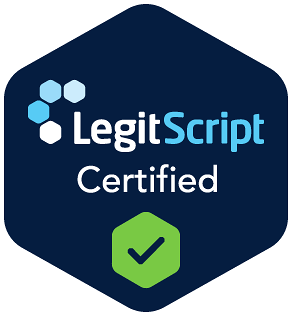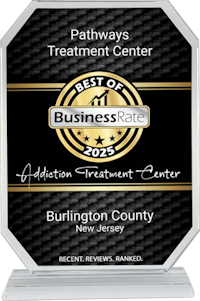Rehab for Opioid
Addiction in Burlington, New Jersey
Opioid addiction is a serious problem affecting individuals across the country, including New Jersey. The state has seen a significant increase in opioid-related deaths and overdoses in recent years. With such devastating consequences for families and communities, it is crucial to understand the nature of opioids and the available options for addiction treatment and rehab in New Jersey.
Opioids are commonly prescribed for pain management after surgery or injury, as they are highly effective at reducing discomfort. However, prolonged use of opioids can lead to tolerance. This means that higher doses are required to achieve the same pain relief. This cycle of escalating dosage can increase the risk of overdose and other serious health complications (especially if someone stops use and then suddenly resumes at that high dose). Additionally, the risk of using other, less safe drugs to achieve the same high. This contributes to the ongoing opioid overdose epidemic in the U.S..
It’s important for individuals prescribed opioids to closely follow their doctor’s instructions and to be aware of the potential risks associated with these medications. Seeking alternative pain management strategies, such as physical therapy or non-opioid medications, can help reduce the reliance on opioids and mitigate the risk of addiction. Additionally, proper disposal of unused opioids is crucial to prevent diversion and misuse.

What Makes Opioids Addictive?
As individuals continue to use opioids, their tolerance builds, requiring higher doses to achieve the same effects. This cycle of escalating dosage can quickly spiral out of control, leading to dangerous levels of drug consumption and increasing the risk of overdose.
Signs of Opioid Addiction and Withdrawal
- Increased tolerance for opioids, requiring higher doses to achieve the same effect
- Physical symptoms like drowsiness, constipation, or pinpoint pupils
- Withdrawal symptoms when attempting to quit or reduce opioid use (known as opioid withdrawal), which can be difficult to manage without professional treatment
- Loss of interest in previously enjoyed activities
- Engaging in risky behaviors to obtain or consume opioids
It is essential to understand that opioid addiction is a medical condition that requires professional intervention. If you or someone you know is exhibiting these signs, it is important to seek help. Early intervention can greatly improve the chances of successful recovery and long-term sobriety.

Who is Most Likely to Develop an Opioid Use Disorder?
- A personal or family history of addiction
- Chronic pain or medical conditions requiring opioid prescriptions
- Exposure to opioids through friends, family, or the healthcare system
- Co-occurring mental health disorders like depression or anxiety
Understanding these risk factors can help identify and address opioid addiction proactively.
It’s important to note that opioid addiction does not discriminate based on age, gender, or socioeconomic status. Anyone can fall victim to the grips of opioid dependence, and it should be treated as a risk whenever someone is prescribed opioids by a doctor. The accessibility and widespread use of opioids in medical settings have contributed to the rise in addiction cases across various demographics.
The stigma surrounding addiction can often prevent individuals from seeking help or disclosing their struggles with substance abuse. But it isn’t a sign of personal weakness if someone develops an addiction to opioids. These substances interact with the brain in a way that reinforces the idea that they’re good for a person. Overcoming addiction requires unlearning these messages and learning how to cope without substances.
Signs of an Opioid Overdose
- Unresponsive or unconsciousness
- Slow, shallow breathing or no breathing at all
- Blue lips or fingertips
- Extreme drowsiness
- Pinpoint pupils
If you suspect someone is experiencing an opioid overdose, seek medical help right away by calling emergency services. Without prompt medical intervention, the risk of a fatal opioid overdose significantly increases.
What Causes Opioid Overdoses?
Additionally, opioids can cause a decrease in blood pressure and heart rate, further complicating the body’s ability to function properly. The combination of these effects can quickly escalate into a life-threatening situation, emphasizing the importance of recognizing the signs of an overdose and seeking immediate medical assistance. Those entering treatment for opioid addiction should ensure that they receive help coping with withdrawals, as returning to opioid use after detoxing is an easy path to an overdose.

Options for Medication Assisted Treatment for Opioid Addiction
Specialized treatment programs can focus on education, family involvement, and building a healthy future, involving the whole family in the recovery process to improve communication and rebuild relationships.
Inpatient rehab provides intensive, 24/7 care in a residential setting. It offers structured therapy, detoxification, and medication management to help individuals overcome opioid addiction. This level of care is suitable for those with severe addiction or co-occurring disorders.
Outpatient programs allow individuals to live at home while attending therapy and counseling sessions. This option is ideal for individuals with a supportive home environment and a lower risk of relapse.
This program combines medications (such as methadone or buprenorphine) with behavioral therapy and other treatments to address opioid addiction. Medication-assisted treatment, also known as MAT, helps reduce cravings and withdrawal symptoms and increase the chances of successful recovery without succumbing to relapse.
Group therapy provides a supportive community for individuals in recovery. These groups offer a safe space for sharing experiences and providing emotional support throughout the recovery journey.
What is Dual Diagnosis Treatment?
Through therapy and medication management, individuals can address their mental health concerns while overcoming opioid addiction. Complete dual diagnosis treatment can involve a multidisciplinary team of professionals that include mental health professionals, an individual’s personal medical team, and social workers. This collaborative approach ensures that individuals receive holistic care that addresses their physical, emotional, and psychological needs.
Dual diagnosis treatment programs may incorporate alternative therapies such as art therapy, mindfulness practices, and yoga to complement traditional treatment methods in addition to conventional treatments like individual therapy. These holistic approaches aim to promote overall well-being and provide individuals with coping mechanisms to manage stress and cravings.
Heal From Opioid Addiction at Pathways Treatment Center
Pathways goes beyond just treating the physical aspects of addiction; our sober living program is designed to help support a person directly outside of rehab and return to normal life without relapse. By equipping individuals with the necessary tools and resources to navigate life post-rehab, Pathways ensures that their patients have a solid foundation for long-term success.
If you or a loved one is grappling with opioid addiction in New Jersey, taking the step to reach out could be what sets you on the path to a healthier, drug-free life. Contact us to learn more and start your journey to recovery today.



